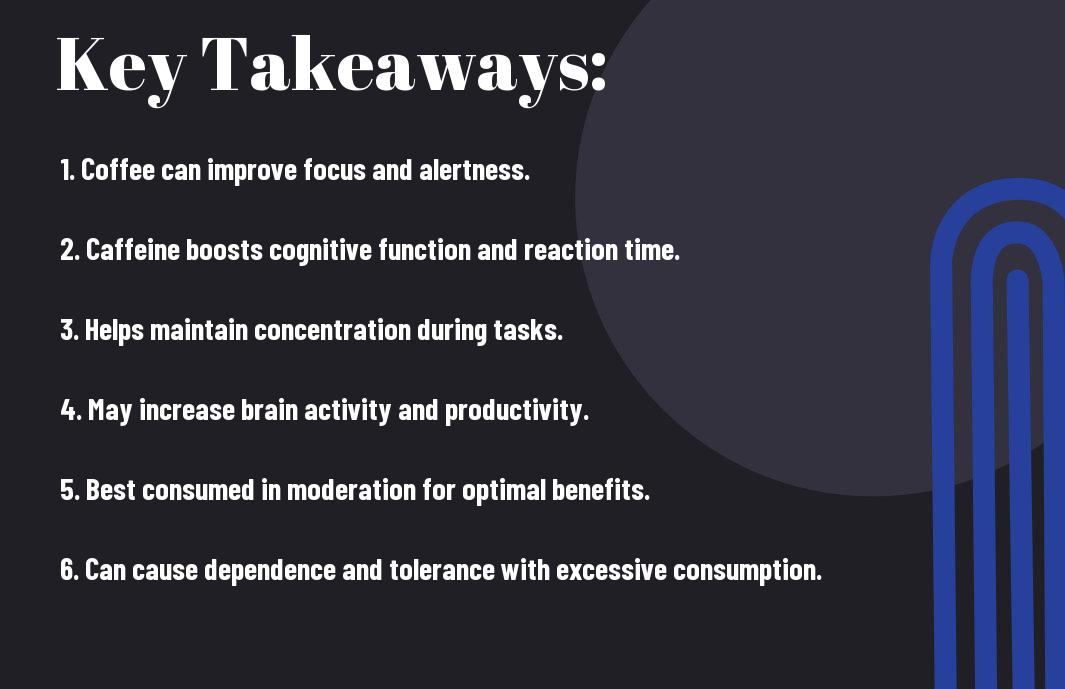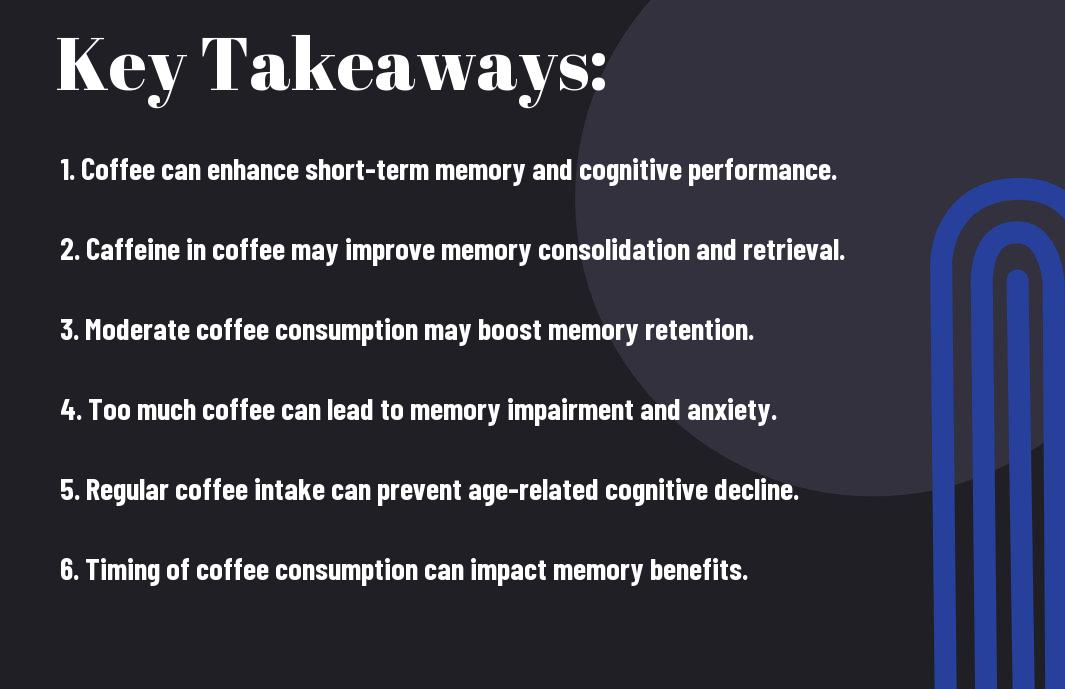Many are curious about the impact of coffee on blood pressure, a topic that sparks discussions among coffee lovers and health enthusiasts alike. Understanding the relationship between caffeine consumption and blood pressure levels is crucial for making informed choices about our daily coffee habits. In this article, we will examine into the scientific research behind how coffee affects blood pressure and explore the potential benefits and risks associated with this beloved beverage.
Key Takeaways:
- Caffeine raises blood pressure: Consuming coffee can lead to a temporary spike in blood pressure due to the caffeine content.
- Effect varies among individuals: The impact of coffee on blood pressure can differ based on factors like age, overall health, and genetics.
- Moderation is key: Enjoying coffee in moderation can help minimize any potential negative effects on blood pressure.
The Basics of Blood Pressure
What is blood pressure?
With Coffee and your blood pressure being a topic of interest, understanding blood pressure is crucial. Blood pressure is the force of blood pushing against the walls of your arteries as the heart pumps blood. It consists of two numbers – the systolic pressure (top number) and the diastolic pressure (bottom number), measured in millimeters of mercury (mm Hg).
How is blood pressure measured?
Pressure is crucial in determining the health of your cardiovascular system. Doctors use a device called a sphygmomanometer to measure blood pressure. It involves wrapping an inflatable cuff around your arm and listening to the blood flow using a stethoscope. The systolic pressure measures the force when the heart beats, while the diastolic pressure measures the force when the heart rests between beats.
It’s important to note that blood pressure can fluctuate throughout the day due to various factors such as stress, physical activity, and even the consumption of substances like caffeine, like in the case of coffee.

Caffeine and Blood Pressure
How caffeine affects the body
Little do many people know that caffeine, the primary stimulant found in coffee, can have a significant impact on blood pressure. When consumed, caffeine is quickly absorbed into the bloodstream and blocks the effects of a neurotransmitter called adenosine. In doing so, caffeine stimulates the central nervous system, increasing alertness and reducing the sensation of tiredness.
The short-term effects of caffeine on blood pressure
One of the immediate effects of consuming caffeine is a spike in blood pressure. Research suggests that within just a few minutes to an hour after consuming coffee, blood pressure can increase significantly. The exact mechanism behind this rise is not entirely clear, but it is believed that caffeine may cause the blood vessels to constrict, leading to a temporary increase in blood pressure.
The short-term increase in blood pressure due to caffeine consumption is typically more pronounced in individuals who do not regularly consume caffeinated products. It’s important to note that while the spike in blood pressure is temporary and usually subsides over time, habitual and excessive consumption of caffeine could potentially lead to long-term issues with blood pressure regulation.

The Science Behind Coffee’s Impact
Vasoconstriction and vasodilation
Vasodilation is the widening of blood vessels, allowing for easier blood flow and lower blood pressure. It is a crucial mechanism in maintaining cardiovascular health. Research, such as a study on Habitual coffee consumption and blood pressure, suggests that habitual coffee consumption may lead to vasoconstriction, the narrowing of blood vessels. This can contribute to increased blood pressure levels over time.
Caffeine’s effect on the cardiovascular system
With its stimulating properties, caffeine is known to increase heart rate and temporarily elevate blood pressure. This can be attributed to caffeine’s ability to block adenosine, a neurotransmitter that helps in the relaxation of blood vessels. As a result, the cardiovascular system experiences a surge, causing blood pressure to rise.
Cardiovascular health is heavily influenced by the intricate balance of vasoconstriction and vasodilation. While coffee can offer temporary perks like increased alertness, it’s important to be mindful of its potential impact on blood pressure. Regular consumption of caffeine through coffee may lead to long-term changes in the cardiovascular system, affecting overall heart health.
Factors Influencing Coffee’s Effect on Blood Pressure
Unlike what many believe, the effect of coffee on blood pressure can be influenced by various factors. Understanding these factors can help individuals make informed choices about their coffee consumption habits. Here are some key factors to consider:
Individual tolerance to caffeine
An individual’s tolerance to caffeine plays a significant role in how coffee affects their blood pressure. Some people are more sensitive to caffeine than others and may experience a greater increase in blood pressure after consuming coffee. It’s necessary to know your caffeine tolerance levels and adjust your coffee intake accordingly to avoid any adverse effects on your blood pressure.
Thou, consulting with a healthcare provider can help determine the appropriate amount of caffeine consumption that is safe for you, taking into account your blood pressure levels and overall health.
Amount and type of coffee consumed
Individual preferences for the amount and type of coffee consumed can also impact its effect on blood pressure. Factors such as the brewing method, serving size, and additives like sugar or cream can all play a role in how coffee affects blood pressure. Some studies suggest that higher consumption of unfiltered coffee, such as espresso or French press, may have a more pronounced effect on blood pressure compared to filtered coffee.
Another important consideration is the caffeine content in different types of coffee. Espresso, for example, typically contains higher levels of caffeine per ounce compared to drip coffee. Understanding these differences can help individuals make informed choices about their coffee consumption habits.
Time of day and sleep patterns
Coffees consumed at different times of the day can have varying effects on blood pressure. For example, consuming coffee in the morning may lead to a temporary increase in blood pressure due to its stimulating effects. On the other hand, consuming coffee later in the day or close to bedtime can interfere with sleep patterns, which in turn may affect blood pressure regulation.
coffee lovers should be mindful of their coffee consumption timing to minimize any potential impact on blood pressure levels and overall health.

The Link Between Coffee Consumption and Hypertension
Does coffee cause hypertension?
With widespread coffee consumption worldwide, there has been much debate about whether coffee can cause hypertension. Research suggests that the relationship between coffee and high blood pressure is complex. Some studies have shown a temporary increase in blood pressure after coffee consumption, especially in people who are not regular coffee drinkers. However, this effect may vary from person to person based on factors like genetics, age, and overall health.
The role of coffee in blood pressure management
Hypertension is a common condition that affects many individuals globally. Surprisingly, coffee may not be entirely harmful when it comes to blood pressure management. Some studies have indicated that regular coffee consumption may not significantly increase the risk of developing hypertension in the long term. In fact, moderate coffee intake could potentially have some benefits for blood pressure due to its antioxidant properties and other bioactive compounds.
Coffee contains antioxidants such as chlorogenic acid, which may have a protective effect on the cardiovascular system. Additionally, some research suggests that coffee drinkers may have a lower risk of developing certain cardiovascular diseases. However, it is crucial to consume coffee in moderation and consider individual factors such as sensitivity to caffeine and overall health status when determining its effects on blood pressure.
Special Considerations
Coffee and blood pressure in pregnancy
Considerations for pregnant women regarding coffee consumption and blood pressure are crucial. It is recommended that pregnant individuals limit their caffeine intake as excessive amounts can negatively impact blood pressure levels. High blood pressure during pregnancy, also known as gestational hypertension, can lead to complications for both the mother and the baby. Therefore, it’s best for pregnant women to consult with their healthcare provider about their coffee consumption and its potential effects on blood pressure.
Coffee and blood pressure in older adults
Coffee consumption can have varied effects on blood pressure in older adults. While moderate coffee consumption may not significantly impact blood pressure levels in healthy older individuals, those with existing hypertension or cardiovascular issues should be cautious. Older adults tend to be more sensitive to the effects of caffeine, which can lead to spikes in blood pressure. It is advisable for older adults to monitor their coffee intake and its influence on their blood pressure to maintain overall health and well-being.
Additionally, older adults may also be taking medications that interact with caffeine, affecting their blood pressure levels. Certain medications used to manage blood pressure can be affected by caffeine consumption, potentially leading to adverse reactions. Consulting with a healthcare provider about the potential interactions between coffee, medications, and blood pressure is crucial for older adults.
Coffee and blood pressure in people with pre-existing conditions
Blood pressure management is critical for individuals with pre-existing conditions, such as hypertension, diabetes, or heart disease. Coffee consumption can impact blood pressure levels differently in individuals with these conditions. For those with hypertension, excessive coffee intake can lead to spikes in blood pressure, increasing the risk of cardiovascular events. People with diabetes may also experience fluctuations in blood pressure due to caffeine’s effects on insulin sensitivity.
Individuals with pre-existing conditions should work closely with their healthcare provider to determine the optimal level of coffee consumption that aligns with their blood pressure management goals. Monitoring blood pressure regularly and making adjustments to coffee intake as needed can help individuals with pre-existing conditions maintain better control over their health.
To wrap up
Considering all points discussed above, it is evident that coffee can have a temporary effect on blood pressure due to its caffeine content. While moderate coffee consumption may not have a significant impact on blood pressure for most individuals, those with hypertension or who are sensitive to caffeine should be cautious and monitor their intake. It is important to consult with a healthcare professional to determine the best approach to consuming coffee while maintaining healthy blood pressure levels.
FAQ
Q: Does coffee affect blood pressure?
A: Yes, coffee can affect blood pressure. The caffeine in coffee is a stimulant that can cause a temporary increase in blood pressure.
Q: How does caffeine in coffee affect blood pressure?
A: Caffeine works by blocking the effects of adenosine, a brain chemical involved in sleep. This blockage leads to increased heart rate and, in some people, can cause a temporary rise in blood pressure.
Q: How much coffee is safe to consume for someone with high blood pressure?
A: It is generally recommended that individuals with high blood pressure limit their caffeine intake to no more than 200-300 milligrams per day, which is roughly equivalent to 1-2 cups of coffee.
Q: Can decaffeinated coffee affect blood pressure?
A: While decaffeinated coffee contains significantly less caffeine than regular coffee, it may still have a slight effect on blood pressure due to other compounds found in coffee. However, the effect is usually less pronounced than with caffeinated coffee.
Q: How quickly does coffee raise blood pressure?
A: The effects of caffeine on blood pressure can be felt within minutes of consumption and may last for several hours. It is important for individuals with high blood pressure to monitor their caffeine intake and its effects on their blood pressure levels.













